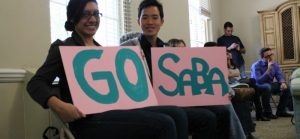Not All DREAMers Are Latinos

 By Claudia Tristán, The HUB@TTU
By Claudia Tristán, The HUB@TTU
She graduated in the top 2 percent of her high school, is in the Honors College at Texas Tech University, and is a Howard Hughes Medical Institute scholar at Tech. However, she has been doing something illegal every day of her life since she was 12 years old.
Saba has been living in the United States illegally since 2004, when her tourist visa expired.
Brought to the U.S. from Pakistan by her parents at the age of 12, her family’s dream for a Green Card fell through when her sponsor, and grandfather, passed away just a month before she arrived with her family to Texas. With her grandmother’s passing soon after, her family had no one to turn to.
 “Basically, when the person that applies for you, the sponsor, when he dies then your whole process is shut down and you can’t really do anything about it,” Saba said. “We didn’t have much. We didn’t know what we could do so we just stayed, I guess over-stayed, the visa.”
“Basically, when the person that applies for you, the sponsor, when he dies then your whole process is shut down and you can’t really do anything about it,” Saba said. “We didn’t have much. We didn’t know what we could do so we just stayed, I guess over-stayed, the visa.”
Tech hosts several other undocumented students like Saba. Diana Ixtlamati has been in the country illegally, brought from Mexico when she was less than a year old.
“We’ve just been here all this time, I never really knew that I was undocumented,” Ixtlamati said.
It wasn’t until Ixtlamati was faced with challenges while applying for university that she realized she was undocumented.
“I had to figure out what I would have to do to apply for financial aid,” Ixtlamati said. “Which was the biggest thing because I knew I could apply to Tech or to other colleges. I just wasn’t sure of the financial aid.”
According to the National Conference of State Legislatures website, Texas is currently one of 12 states which allow undocumented students, meeting specific requirements, to receive in-state tuition rates.
As a result of coming to college, a fear began to grow inside of Ixtlamati. She feared every day that she would be deported before being able to complete her first degree in animal science.
“It would make me very nervous to talk about that because I didn’t know what would happen,” Ixtlamati noted.
Ixtlamati’s fear became very real for Saba when U.S. Immigration Customs and Enforcement officers came knocking on her door in April. As a result, Saba’s family was put under administrative arrest.
The following summer, President Obama released his plan for undocumented people, Deferred Action. Deferred Action, according to the Homeland Security website, is a program that gives certain young people, brought to the U.S. as children, the security to not be removed from the country or put into removal proceedings. Applicants must fulfill certain criteria to be approved. Once approved people’s lawful status does not change, however they are not considered to be ensuing unlawful presence in the U.S. and will be eligible to apply for work authorization.
As a result of Deferred Action, Saba and her two older sisters were given a path to remain in the country while their parents waited for their court hearings.
Diego Torres considers the release of Deferred Action perfect timing. With his graduation just days away, he needed legal status to work in his field of study, mechanical engineering.
“Since that day, I started looking towards the requirements, what documents I was going to need,” Torres said.
He gathered medical documents, school documents, bank statements, and anything else he could use to prove that he was qualified for Deferred Action. Despite being prepared, Torres took some time to turn in his application.
“It took me about a week to turn in the application, a week after August 15. It took me so long, not because I wasn’t finished, just that I wasn’t sure about it.”
Torres tried to seek outside help from the League of United Latin American Citizens, FielHouston Immigration Youth Organization, and a few lawyers but decided not to use any of them as they charged too much. Ixtlamati had difficulty with some of the technicalities of the application and also looked for a lawyer, but couldn’t afford one. She has yet to turn in her application.
Prior to Deferred Action, Torres and Ixtlamati’s only option to remain in the U.S. was to marry a citizen. Both believed this was not a solution to their problem. However, they believe neither is Deferred Action.
“Deferred Action, I’m very grateful for it but there needs to be something more secure,” Ixtlamati said. “Something more stable to help undocumented students.”
Ixtlamati hopes a solution will arise before she completes her second degree in zoology and goes on to medical school. Torres’ application has been approved and he has received a work permit.
“Deferred Action is just a temporary thing. It’s only for two years and then you can reapply for it, but we’re still in the limbo. I think it’s just a shame,” Torres said.
Saba understands the difficulty for people to sympathize with students like herself.
“I know that if you’re looking from the outside you’re not going to see everything because you’re not in that situation,” she said.
“[Undocumented students] could go back with their talent and make their country win a Nobel Prize,” she said, “but don’t you want that for America? Don’t you want them to stay? I just want them to know that there is absolutely nothing wrong with kids like us pursuing our dream.”
This article was first published in The HUB@TTU.
Claudia Tristán is the Online Editor @HubTTU. She has also been Bilingual Digital Editing Intern @MLS @Futbol_MLS; Congressional Intern @TX20CharlieG, @HispanicCaucus.
[Photo by Claudia Tristán]
